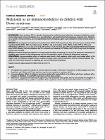| dc.contributor.author | Kelly, Lynne | en |
| dc.contributor.author | Roche, Edna | en |
| dc.contributor.author | Doherty, Derek | en |
| dc.date.accessioned | 2022-02-23T07:30:54Z | |
| dc.date.available | 2022-02-23T07:30:54Z | |
| dc.date.issued | 2022 | en |
| dc.date.submitted | 2022 | en |
| dc.identifier.citation | Huggard D, Kelly L, Worrall A, Gallagher G, Fallah L, Yoo LL, McGrane F, Lagan N, .Roche E, Balfe J, Doherty DG, Molloy EJ, Melatonin as an immunomodulator in children with Down syndrome, Pediatric Research, 2022 | en |
| dc.identifier.other | Y | en |
| dc.identifier.uri | http://hdl.handle.net/2262/98156 | |
| dc.description | PUBLISHED | en |
| dc.description.abstract | Background: Down syndrome (DS) is a disorder characterised by marked immune dysfunction, increased mortality from sepsis, chronic inflammation, increased oxidative stress, sleep disturbance and possibly abnormal endogenous melatonin levels. Melatonin has a myriad of immune functions, and we hypothesised that this therapeutic agent could modulate the innate immune system in this cohort.
Methods: We investigated neutrophil and monocyte function (CD11b, TLR4 expression by flow cytometry), genes involved in TLR signalling (MyD88, IRAK4, TRIF), the inflammasome (NLRP3, IL-1β), and circadian rhythm (BMAL, CLOCK, CRY) by qPCR, and inflammatory cytokines (IL-2, IL-6, IL-8, IL-18, IL-1β, TNF-α, IFN-γ, IL-10, IL-1ra, VEGF, Epo, GM-CSF) by enzyme-linked immunosorbent assay (ELISA) following immunomodulation with LPS endotoxin and melatonin. 47 children with DS and 23 age- and sex-matched controls were recruited.
Results: We demonstrated that melatonin has several significant effects by reducing CD11b and TLR4 expression, attenuating TLR signalling, genes involved in the inflammasome and has the potential to reduce LPS-induced inflammatory responses.
Conclusions: Immunomodulatory effects of melatonin were found in both paediatric cohorts with more marked effects in the children with DS. Melatonin mediates immune response through a wide array of mechanisms and this immunomodulator may buffer the inflammatory response by regulating pro and anti-inflammatory signalling.
Impact: We highlight that melatonin mediates its immune response through a wide array of mechanisms, its effects appear to be dose dependant and children with Down syndrome may be more receptive to treatment with it. Immunomodulatory effects of melatonin were demonstrated with marked effects in the children with Down syndrome with a reduction of MyD88, IL-1ß and NLRP3 expression in whole-blood samples. Melatonin is a proposed anti-inflammatory agent with a well-established safety profile, that has the potential for mitigation of pro- and anti-inflammatory cytokines in paediatric Down syndrome cohorts, though further clinical trials are warranted. | en |
| dc.language.iso | en | en |
| dc.relation.ispartofseries | Pediatric Research | en |
| dc.rights | Y | en |
| dc.title | Melatonin as an immunomodulator in children with Down syndrome | en |
| dc.type | Journal Article | en |
| dc.type.supercollection | scholarly_publications | en |
| dc.type.supercollection | refereed_publications | en |
| dc.identifier.peoplefinderurl | http://people.tcd.ie/kellyl37 | en |
| dc.identifier.peoplefinderurl | http://people.tcd.ie/dohertde | en |
| dc.identifier.peoplefinderurl | http://people.tcd.ie/rocheef | en |
| dc.identifier.rssinternalid | 232947 | en |
| dc.identifier.doi | http://dx.doi.org/10.1038/s41390-021-01611-6 | en |
| dc.rights.ecaccessrights | openAccess | |
| dc.subject.TCDTheme | Immunology, Inflammation & Infection | en |
| dc.identifier.orcid_id | 0000-0002-4782-1143 | en |
| dc.subject.darat_impairment | Brain Injury | en |
| dc.status.accessible | N | en |




